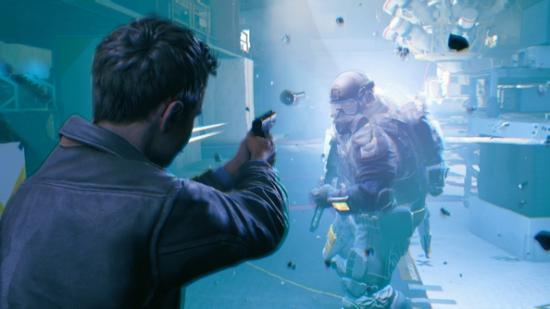Out next month after almost half a decade in development, Remedy’s time-twisting Quantum Break is a big deal for Microsoft on several fronts. Once upon a time it was a posterchild for the publisher’s “broad entertainment” push on Xbox One, melding live-action TV episodes with sci-fi cover-shooting. Latterly, it has become a flagship title for the youthful Windows 10 Store and DirectX 12. It’s also probably the only game you’ll ever play in which Littlefinger throws Iceman through a door.
What other upcoming PC games will be joining Quantum Break in the near future? Take a look.
The PC version of Quantum Break is among the first to run on the Universal Windows Platform, a set of development tools which are designed to work across Xbox and PC. Supposedly, the rise of Universal Windows Apps means that Microsoft can even upgrade the Xbox One itself much like a PC, without forcing owners of the original version to fork out, because UWAs scale to fit the specifications of the device. They’re calling it the end of the console business as we know it.
At an event in London, I asked Remedy’s head of media and partners Thomas Puha for his thoughts on Microsoft’s ambitions, and how the creators of Max Payne fit into a world in which practically everybody is developing for mobile. Watch out for hands-on impressions of Quantum Break next week.
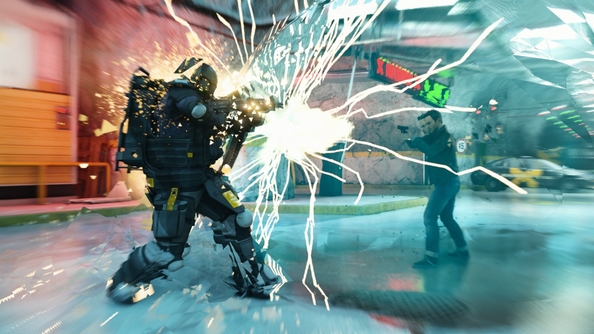
PCGN: So how has the Universal Windows Platform been to work with?
Thomas Puha: Absolutely brilliant! [laughs] It’s OK. Windows 10 is very new, so that it inherently makes it a little bit difficult. It’s new and it’s missing features that PC gamers especially expect, so there’s a lot of stuff that Microsoft has on the roadmap that would be lovely to have right now, but software is software – it’s never done. So yeah, it’s been a bit different, but there are also lots of things that are sort of resolved on our behalf, which is kind of nice, and a lot of the reasoning about how that sandbox works is sound. Does it need more features? Yes, of course it does. But there are also things that have made our life a bit easier. It’s basically almost like launching on a new platform: we’ve dealt a lot with the Windows 10 team, dealing with various things, which has been challenging to say the least, but at the same time it’s nice to have the ear of Microsoft.
Were you brought onto the UWP project pretty early, to help Microsoft put together a showpiece game for Universal Windows Apps?
Well, that’s what it’s supposed to be. But obviously the build we’re showing today isn’t quite there. It could run at higher resolution and a better frame rate [writer’s note: the Windows 10 build at the event ran at 1080p and 30fps – the final game will run at 60 fps and support 4K], and we have that working in the office, but there’s still stuff to figure out. The nice thing is we still have some time to do it. If we had let’s say, launched six months down the line there would be fewer questions! We just have to figure out a lot of the things that Windows 10 has. We talk with the other developers, we talk with the Gears of War guys and the Forza guys, and obviously we have the ability to give very direct feedback to Microsoft.
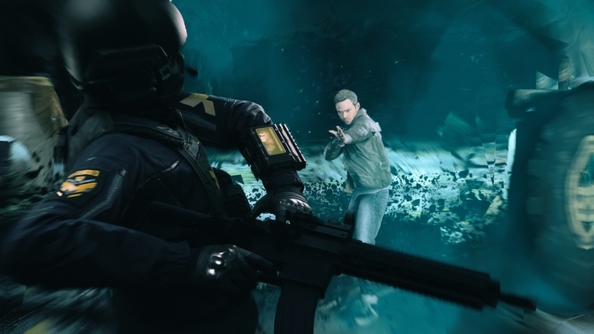
And Microsoft, Phil Spencer – honestly they’re good at that, they do listen. It’s just… making software is quite annoying. The list of things you want to do is always so much greater than the resources available. No matter how big a team you are, you’re never able to release everything on day one. Everything takes a while.
So working on Quantum Break for PC is consistent with your previous experiences of software launches? The teething troubles are to be expected?
Kind of, yes. It’s a different thing but we have guys who shipped Killzone on PS4, which was a launch title on a brand new platform where everything comes together at the last minute, and that they told me was absolutely crazy – you launch and it’s “fingers crossed that it works”. This is not quite the same thing! Obviously Windows has been around for a long time. So from that perspective it’s completely fine.
Phil Spencer has hinted that Microsoft will upgrade the Xbox console hardware within a generation, because all the games made for UWP will be compatible with old and new versions of the same Xbox. It’s blurring the lines between console and PC. Do you think that’s a credible prospect, based on your work on the UWP so far?
I don’t think if we honestly think about it all that much. We’re just heads down making the game. You learn that making forward-looking decisions, like ‘maybe in three years time, software will be like this’ – that’s usually never the case. But I think the ideology that Microsoft has there is quite sound. Just to try to make it easier for people on a variety of platforms to have the same experience. But it’s incredibly difficult, because you inherently need to have some sort of walled garden, you have to tie certain things down to ensure people get the same experience across different devices.

And that sort of goes against the grain on PC, where it’s all about using the hardware you want, from your graphics card to your monitor, everything. And people say “well, you had Games for Windows before – do you really believe in it this time?” Phil Spencer has said they’re in it for the long haul, and everything we’ve seen of what they’re doing honestly does support that. At the end of the day, consumers will decide and Microsoft is listening.
I still think about, like, when I played Half-Life 2 for the first time and you needed to have Steam running, and some people were up in arms about that – I didn’t mind, it worked fine for me. If you look at what it was back then, and what it is now… it’ll definitely change a lot, even this year – that whole sandbox will. So we’ll see.
I remember when Half-Life 2 launched, reading the complaints about installing Steam. ‘What if it clashes with other software? Do I really need it running all the time?’ It’s amazing what we all get used to, I guess.
Yeah, but that also sets the expectations. People think that UWP, the Windows 10 Store and all at that, should be at a certain level at launch. And it takes a while to get there, and you can say ‘well, they’re not there, but we can look at what the community wants’, and hopefully Microsoft can react to that.
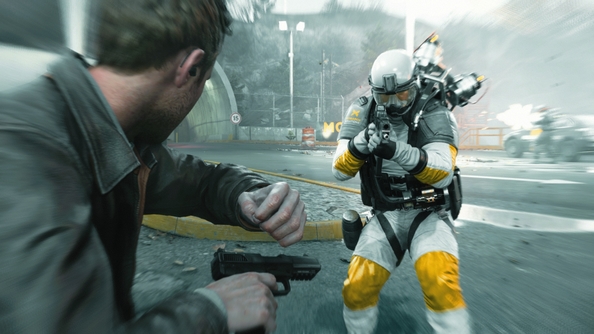
It feels like they have two fundamental challenges – firstly, to persuade console buyers that they want something more like a PC, in terms of how often they upgrade, and secondly, to ensure that developers on Xbox continue to enjoy something like the financial stability that a console provides. And that comes down to how well the UWP actually works across platforms.
Yeah, the nice thing about console is that it’s fixed for the most part. Me personally, I grew up on the Commodore 64 and then moved onto the PC, and back in the 90s I’d spend an hour trying to get a game working, to free up enough memory, across MS-DOS and Windows, and it was frustrating. But it also gives of a lot of choice – it’s just as a developer it’s difficult to support all that. If you have a 5,000-year-old PC, how do we make sure the experience on the lesser machine is still good? So that’s difficult, but at Remedy we’ve always made games for the PC, it’s part of our heritage, and there’s a lot of pride in making the Windows 10 version as good as it can be.
At the end of the day, the more people who can experience our game, the better. When you spend this long working on a game, you do want as broad an audience as possible. I don’t think having the game running on Windows 10 takes away from the Xbox One – I like playing on a console, I like being on the couch in front of a big TV, and then there are people who want a monitor and a mouse and keyboard. Whatever your preference, we try to accommodate that, and that’s what Windows 10 and UWP are designed to do. Right now it makes life a little bit more challenging for us developers, but down the line it’ll hopefully make things a lot easier, to support the whole ecosystem.
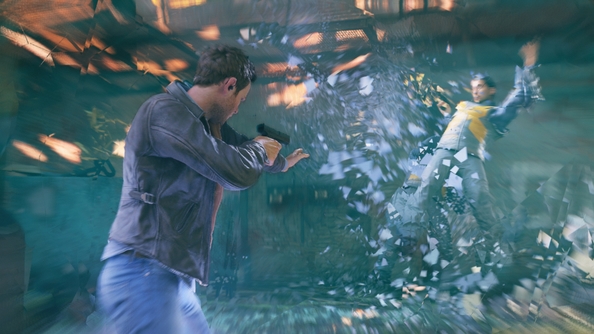
I agree that broadly it sounds like a positive move for Microsoft – offering the best of both worlds across console and PC. But the practicalities are tricky.
Yeah, and look if there’s one company that can get there, it’s Microsoft. They’ve developed software for a long time! You look at how well Xbox Live works and everything associated with it, that’s a company that has done engineering and software all its life. So they do know this stuff, but it’s not easy at all. And things change so rapidly in the games industry. What was cool this year, the way people want to consume entertainment and games, 15 months later it’s completely different. You need to plan things, but also react to things, and hopefully Microsoft will react rapidly to what gamers want from Windows 10.
The advantage of UWP is that it does in theory allow them to be flexible – that pace of change is what they’re trying to design for. Last week Phil talked about the influence of the mobile market, where consumers have come to expect frequent hardware roll-outs and continual evolution. That must be quite a scary prospect, for a developer that’s taken four or five years to make a game.
Yeah! Especially given that we’re based in Finland, which is the hub of mobile games development these days, from Clash of Clans and Angry Birds. I come from a console-PC background, so I like the kinds of games we make – we spend a long time making a game and it’s a very defined experience. It’s not like a service-based, constantly updated thing, which is what most mobile games are. Having said that, Remedy does look at everything very carefully and we try to adapt, but you have to play to your strengths. So we’ll see how it goes! Especially in Finland, the last few years have been completely crazy. We had maybe 10 studios 10 years ago, and now there’s a hundred in Helsinki alone – hundreds of studios are making mobile games, and we’re the dinosaur still working on triple-A experiences! Along with Housemarque and the Redlynx guys. There’s room for everybody, I guess.
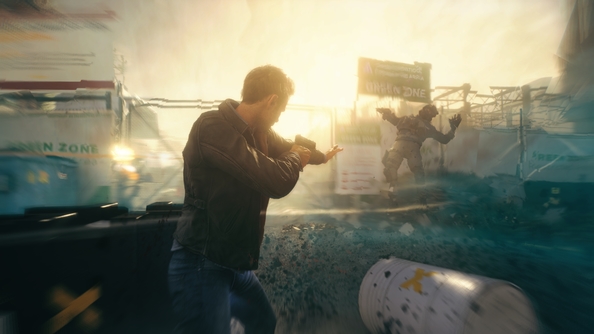
As long as you do what you do well. Quantum Break seems very promising.
Thanks. It’s been a long time coming. And like Sam says, you’re only as good as your last game, you really are. It’s a very cut-throat business. And when you start out making a game in 2011, 2012, things change in four years – not just your creative vision for the game, but what’s popular in games. So that especially is a challenge, it takes a long time and it’s expensive to make the kinds of games we make, where it’s very story-driven. We like to think we offer a lot of replay value, but we’re not a very systemic game, whereas Destiny, for instance, drops you in there and you create your own story with your friends. So we definitely look at things like that, but you have to stick to your guns and do what you’re good at.
I hope you continue to find success as a narrative developer, because there are so many system-driven games now. Many of them are brilliant, but it’s surprisingly refreshing to play an action game that says ‘no, story first’.
That’s really good to hear. That’s what I personally think. I loved Rise of the Tomb Raider very much, I’m looking forward to Uncharted 4 – I like these contained experiences, because when I think back to the 90s, the first PlayStation, I’d find something like Vagrant Story or Final Fantasy, all these games where once you’re done with it, there it goes onto the shelf, and it felt good to get through it. Now, you have to spend hundreds of hours on a lot of games to get everything, unlock everything, and that actually turns me off. With some games, anyway. I’m a hardcore Destiny player, I’ve spent like 1600 hours on it, and you know what, that means I don’t play other games because I have to spend so much time with Destiny.
So I do think that our kinds of story-driven games are actually making a – “comeback” is probably the wrong word, but I do think people are happy to play something through, a really good story with a clear ending. I hope that there is still space for what we do. At the end of the day, gamers decide.
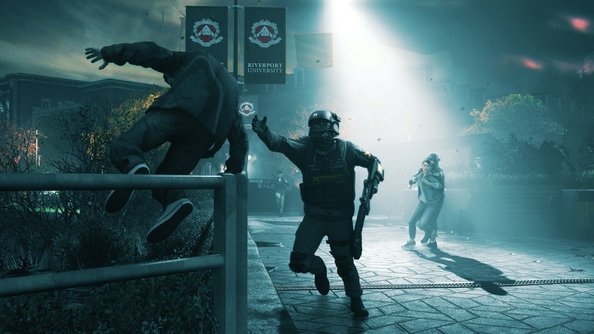
Microsoft is quite a good partner for you, because they have a fair few story-driven franchises – Halo, Fable and Gears of War. One thing that intrigues me, though, is that they began this generation by talking up TV consumption on Xbox One, with a dedicated production studio and original programming and everything. That’s obviously fallen back a bit…
Yeah. Completely!
Did that change of direction bother you in any way, given all the live action content in Quantum Break? I guess as a second party you’re sealed off from what happened to Xbox Entertainment Studios.
Yeah, we have been quite separate from that. Originally when Quantum Break was signed they wanted live action to be a bigger component, and we planned it that way – that was part of it, back then, Microsoft wanted to push live action. But actually from the very beginning we’ve worked with Lifeboat, this Los Angeles-based production company behind the live action show – they’ve always been separate from Microsoft’s entertainment studio. I mean sure, when it was closed down we thought ‘does that impact us?’ but in the end it really didn’t. And I think you have to take care of gamers first. A videogame console audience is going to be gamers, they don’t care about if they get to watch 15 original TV shows – they want to play games. That’s the important bit.
How do you feel about Universal Windows Platform, and Microsoft’s plan to meld the worlds of PC and Xbox One? Let us know in the comments below.
